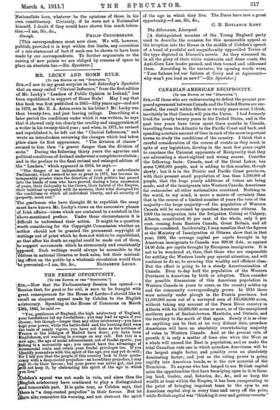MR. LECKY AND HOME RULE.
[To TH2 EDITOR OF THE "SPECTATOR."] saw to my great surprise in last Saturday's Spectator that an essay called "Clerical Influence," from the first edition of Mr. Lecky's "Leaders of Public Opinion in Ireland," has been republished in support of Home Rule ! May I say that this book was first published in 1861—fifty years ago—and not in 1870, as Mr. E. A. Aston avers in his letter P Mr. Lecky was then twenty-two, and just leaving college. Describing at a later period the conditions under which it was written, he says
that it showed only too clearly the crudity and exaggeration of a writer in his twenty-third year; and when, in 1871, he revised and republished it, he left out the "Clerical Influences," and wrote an introduction reviewing the changes which had taken place since its first appearance. "The division of classes" seemed to him then "a graver danger than the division of sects." During the following thirty years the agrarian and political conditions of Ireland underwent a complete revolution ; and in. the preface to the final revised and enlarged edition of the "Leaders," which appeared in 1903, he says :— " The danger of an independent or even of a subordinate Parliament, which seemed to me so great in 1871, has become in- 'comparably greater since the direction of Irish politics has passed into the hands of men who have proved, during a long succession of years, their disloyalty to the Crown, their hatred of the Empire, .their habitual sympathy with its enemies, their total disregard for the conditien.s on which all individual liberty, and all security of iproperty, must rest."
The gentlemen who have thought fit to republish the essay must have known Mr. Lecky's views on the successive phases t of Irish affairs—views which are contained in a nutshell in the -above-mentioned preface. Under those circumstances it is
[difficult to understand their action. It might be a question iworth considering for the Copyright Commission whether an 1 author should not be granted the permanent copyright of
writings out of print which he does not wish to be republished, so that after his death no capital could be made out of them, to support movements which he strenuously and consistently iRpposed. Such writings would always be accessible to the
eflrions in national libraries or book sales, but their mislead- ing effect on the public by a wholesale circulation would thus
be prevented.—I am, Sir, &c., ELIZABETH LECKE.










































 Previous page
Previous page